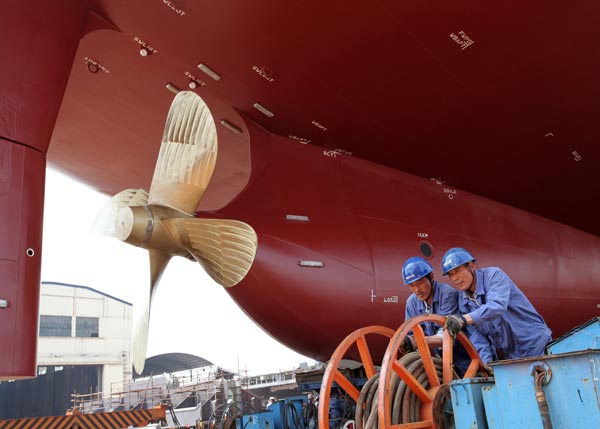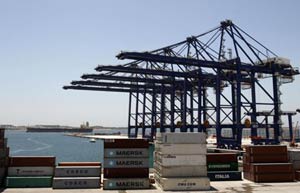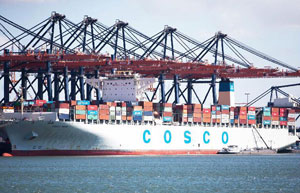|
 |
|
Workers undertake safety checks of a 35,000-ton bulk carrier at a shipyard in Nanjing, Jiangsu province. [Photo/China Daily] |
Switch to offshore engineering projects keeps orders flowing, reports Zhong Nan in Qidong, Jiangsu.
|
 |
 |
Supported by accumulated technical know-how, lower production costs and the government's strong desire to secure more offshore oil, Chinese shipbuilders are launching a strong challenge to their next-door rivals.
Zhang Guangqin, president of the China Association of the National Shipbuilding Industry, said even though offshore engineering equipment such as drilling platforms, wind power devices, maritime crane ships and dredgers are more expensive and complex to build, the burgeoning global demand for energy resources is expected to keep orders flowing.
Offshore engineering products are essentially functional vessels and oil drilling platforms that can operate in deep water.
Offshore gas and oil companies use these vessels to process the natural gas and crude pumped up from the ocean floor. In some cases, they are also used in the extraction process.
"While the global shipping industry is unlikely to see an upturn within a short period, demand for offshore energy vessels has surged in recent years," Zhang said.
COSCO (Nantong) Shipyards Co, a unit of COSCO Shipyard Group Co Ltd, which is a subsidiary of China Ocean Shipping (Group) Co, is one of the Chinese shipbuilders that has shifted from its core business of shipbuilding and ship maintenance to offshore engineering products.
Shipbuilding and maintenance now account for just 5 percent of the annual sales at COSCO (Nantong) Shipyards.
In contrast, the company has invested more than 200 million yuan ($32.5 million) a year to attract foreign professionals and boost technological and innovative expertise in offshore engineering.
Ni Tao, managing director of COSCO (Nantong) Shipyards, said China will take over the crown from South Korea in the next five years with this dramatic change occurring faster than the global leader expected.
"As China and many nations' energy future will depend on deep water oil and gas, this industry won't face a slowdown in the next several decades. Deep water fields yet to be discovered and developed are expected to be the main sources of conventional energy," Ni said.
International Maritime Associates Inc, a Washington DC-based consultancy that specializes in strategic planning for companies in the offshore industry, estimated the world's ocean oil reserves are between 140 billion and 200 billion metric tons. About 109 offshore oil and gas projects are being planned at an investment of $189 billion in the next five years.
COSCO (Nantong) Shipyards will deliver eight offshore engineering products, including wind turbine installation vessels, jack-up and floating oil drilling platforms to Norway, Britain, the Netherlands and Denmark this year.
The company's sales revenue reached 8 billion yuan in 2013, increasing 25 percent from a year earlier.
To further diversify its business scale, Ni said the company will cooperate with the China Export and Credit Insurance Corp to build a semi-submersible oil drilling platform for hire at a daily rental fee of $500,000. Certain energy companies are still having trouble gaining the funding to own such a vessel outright.
China's offshore engineering products amounted to $18 billion in 2013, up 16 percent year-on-year and accounting for 29.5 percent of the global market, according to data from the Ministry of Industry and Information Technology.
